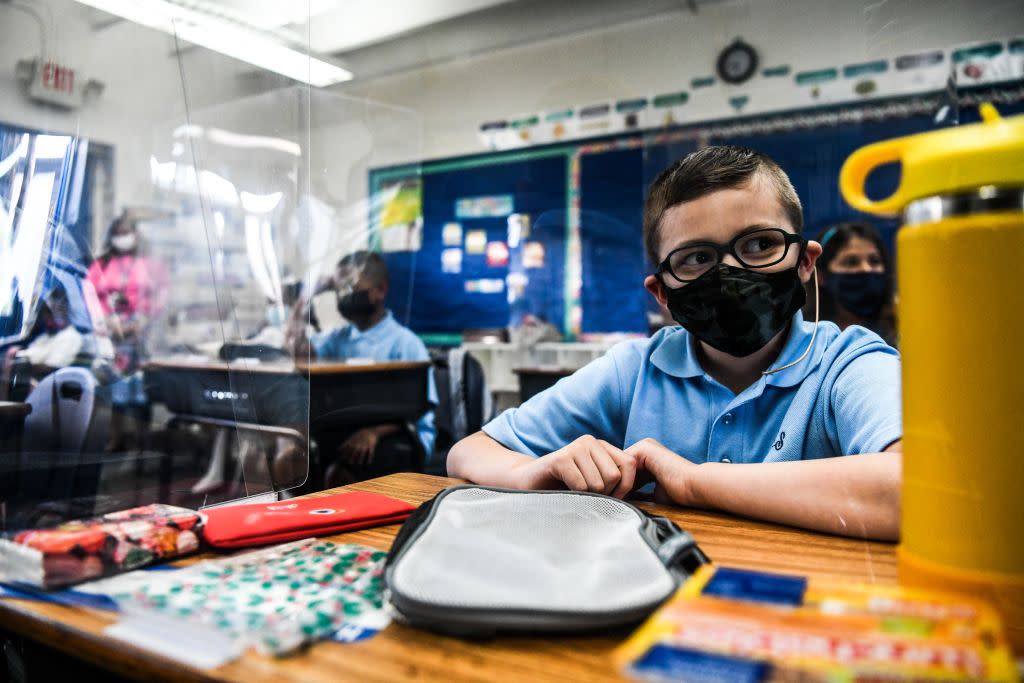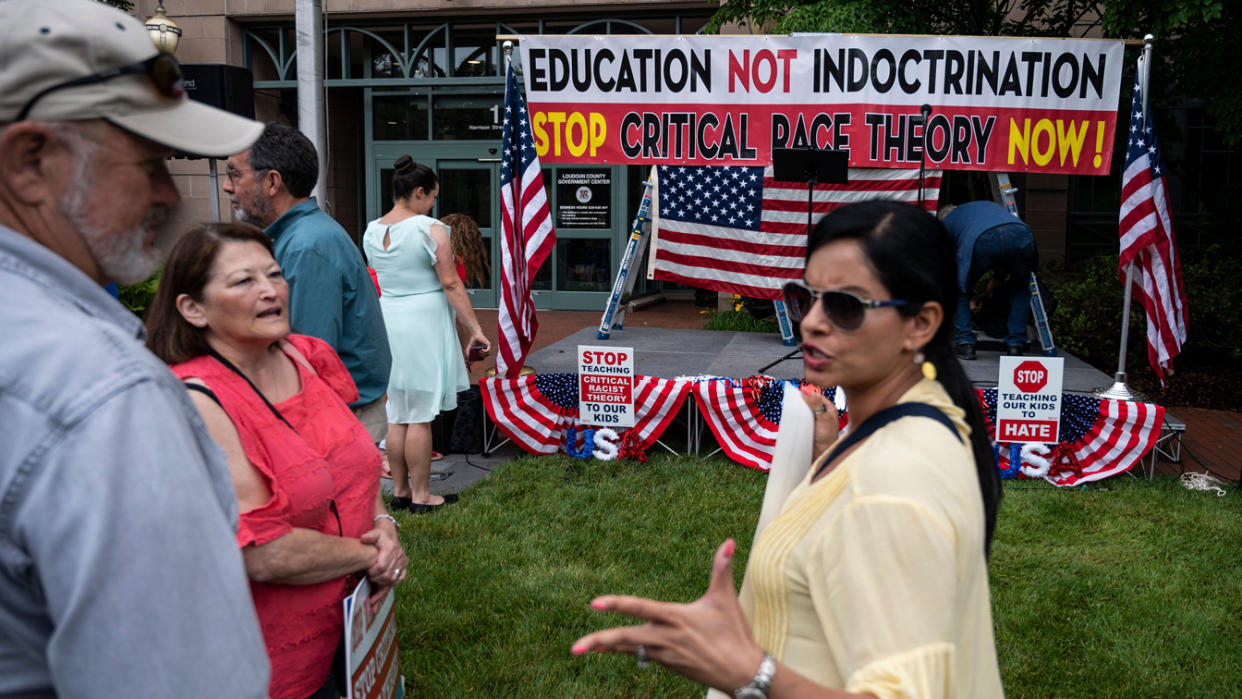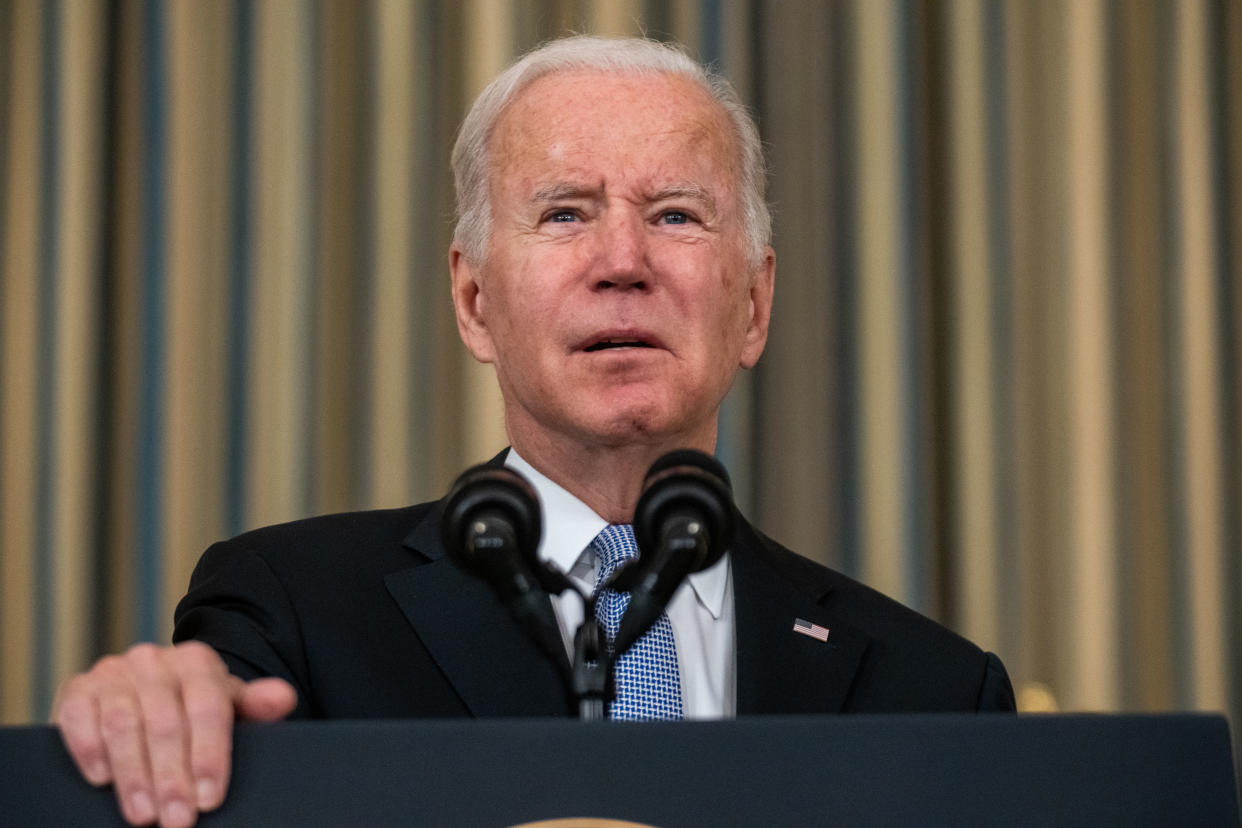Poll: As GOP bets on backlash over COVID and race, just 5% of parents say schools are their top issue for 2022
When thinking about next year’s elections, a mere 3 percent of Americans — including just 2 percent of Republicans and 5 percent of parents with kids under 18 — say schools are the most important issue to them, according to a new Yahoo News/YouGov poll.
Those meager numbers suggest that while some sliver of the electorate may continue to fixate on COVID restrictions, critical race theory (CRT) and other so-called violations of “parents’ rights” — the issues that supposedly drove Democrats to defeat last week in otherwise blue Virginia — widespread school backlash would appear unlikely to define or decide the 2022 midterms.
At the same time, Democrats could face serious setbacks one year from now unless they restore faith in their economic stewardship — and unless President Biden can revive his cratering approval numbers.

The survey of 1,673 U.S. adults, which was conducted from Nov. 4 to 8, indicates that an emphasis on school curricula, particularly when it comes to lessons on race and racism, isn’t necessarily the GOP’s best bet for winning back control of Congress and state capitals next November.
As prices rise and shortages persist, the number of Americans who say the economy is the most important issue to them when thinking about the 2022 elections (31 percent) is 10 times higher than the number who say the same about schools. The number who choose health care as their most important issue, meanwhile, is four times higher (13 percent); those who say climate change (10 percent) or the coronavirus (10 percent) is three times higher. Immigration (9 percent) and changing the balance of power in Washington (8 percent) also outrank schools.
The reason schools languish near the bottom of the list is simple: 54 percent of Americans — and, more to the point, 60 percent of parents — rate schools in their area as either excellent or good. Less than a third (32 percent) of either group describe their schools as only fair or poor.
Likewise, when asked to name the biggest problem facing local schools, few parents select the hot-button issues that Virginia Republican Glenn Youngkin campaigned on and that his party is hoping to weaponize in 2022 — things like “mask mandates” (5 percent) and “the way they teach about race and racism” (7 percent). More choose “lack of funding for education” (18 percent) and “low pay for teachers” (15 percent) instead.

A full 62 percent of parents, in fact, say students and staff should still be required to wear masks in school, and twice as many say students should be exposed in class to the idea that “racism is not merely the product of individual bias or prejudice, but also something embedded in legal systems and policies” (51 percent) as say they shouldn’t (26 percent) — essentially the opposite of the GOP’s new message.
To be sure, some parents are dissatisfied with how schools have dealt with race and COVID. While 56 percent rate their own schools’ pandemic policies as good or excellent, nearly a third (32 percent) grade them as only fair or poor; after schools were shuttered in 2020, half of parents (50 percent) reported that their children were learning less online, and most (73 percent) were very or somewhat concerned about their children falling behind academically. And when asked to gauge how their local schools have handled “teaching about race and racism,” just 42 percent give them high marks, while 34 percent say the opposite; nearly a quarter (24 percent) say they’re not sure.
There’s no doubt that a portion of this unease with race in schools is coming from the right. More Republicans rate their schools’ teaching on race and racism as fair or poor (38 percent) than good or excellent (25 percent), and 2020 Donald Trump voters are far more likely to say students in their area are being exposed to CRT in class (33 percent) than 2020 Biden voters are (9 percent).
Yet many Americans on the other side of the political spectrum also seem uneasy with how schools are teaching race and racism — for completely different reasons. For instance, Black Americans are more likely to give their schools low ratings on the question about race and racism instruction (43 percent) than whites (34 percent), Republicans (38 percent) or even Trump voters (42 percent). By the same token, Americans who believe students should be exposed to the idea of embedded, systemic racism in school are more inclined to say their schools are doing a poor or only fair job teaching about race and racism (37 percent) than a good or excellent job (31 percent).

In other words, there’s no consensus on how schools should handle race and racism — just polarization.
So while Republicans may continue to rile up their base with attacks on CRT, the broader appeal of such a strategy could be limited. For one thing, respondents on the right are far more confident they understand CRT than anyone else, with 30 percent of Trump voters, 30 percent of conservatives, 23 percent of Fox News viewers and 22 percent of Republicans saying they know "a lot" about the theory, compared with just 8 percent of parents and the same percentage of Democrats.
As a result, perceptions of what the term means have become completely polarized too. While Biden voters select “a scholarly approach to race studies not typically encountered until college” (49 percent) and “a way of thinking about systemic racism that has influenced the broader culture” (57 percent) as phrases that describe CRT “very” or “somewhat” well, Trump voters gravitate toward “an attempt to blame white people today for racism of the past” (69 percent) and “a form of ’reverse racism’ that divides people based on the color of their skin” (65 percent) instead — and in greater numbers. Hence all the outrage on the right.
Yet the vast majority of U.S. adults — more than 6 in 10 — say they’ve never heard of CRT (42 percent) or know nothing (5 percent) or only a little (14 percent) about it. Asked whether CRT is something students in their area are being exposed to in school, just 18 percent of parents say yes; the rest either say no (18 percent), they’re not sure (10 percent) or they’re unfamiliar with the term (54 percent). And parents who have heard of CRT are equally divided over whether kids should (20 percent) or shouldn’t (21 percent) be exposed to it. With numbers like those, a broad “parents’ rights” backlash is, at this point, unlikely.
For Democrats, the more obvious problem heading into 2022 is Biden’s unpopularity. A majority of Americans (51 percent) now disapprove of how the president is handling his job — more than in any previous Yahoo News/YouGov poll. His approval rating is 9 points lower (42 percent). On several specific issues — including the economy (40 percent approve to 51 percent disapprove), the war in Afghanistan (34 percent approve to 52 percent disapprove) and dealing with Congress (33 percent approve to 52 percent approve) — Biden’s numbers are even worse.
When asked who they’d rather see as the Democratic presidential nominee in 2024, more Democrats and Democratic-leaning independents now say “someone else” (41 percent) than say Biden (38 percent).

Meanwhile, approval of Congress as an institution is also at a low point for Biden's presidency: 15 percent approve to 61 percent disapprove.
Yet even amid such gloomy data, there remain a few small signs of hope for Democrats. Asked how they would vote in their district if congressional elections were being held today, more Americans still say Democratic (36 percent) than Republican (33 percent). And on Friday, Congress passed Biden’s signature $1.2 trillion bipartisan infrastructure bill, which Americans favor by a 2-to-1 margin (51 percent to 25 percent). Among those who disapprove of Congress, more say they disapprove because legislators “aren’t changing enough about America” — 30 percent of all U.S. adults, including 40 percent of Democrats and 31 percent of independents — than say they disapprove because legislators are “changing too much” (28 percent).
So it’s likely that the more that Biden and his party accomplish over the next 12 months — and the more that COVID conditions and economic indicators improve — the less they’ll have to engage in a culture war over schools.
The Yahoo News survey was conducted by YouGov using a nationally representative sample of 1,673 U.S. adults interviewed online from Nov. 4 to 8, 2021. This sample was weighted according to gender, age, race and education based on the American Community Survey, conducted by the U.S. Bureau of the Census, as well as 2020 presidential vote (or non-vote) and voter registration status. Respondents were selected from YouGov’s opt-in panel to be representative of all U.S. adults. The margin of error is approximately 2.5 percent.


